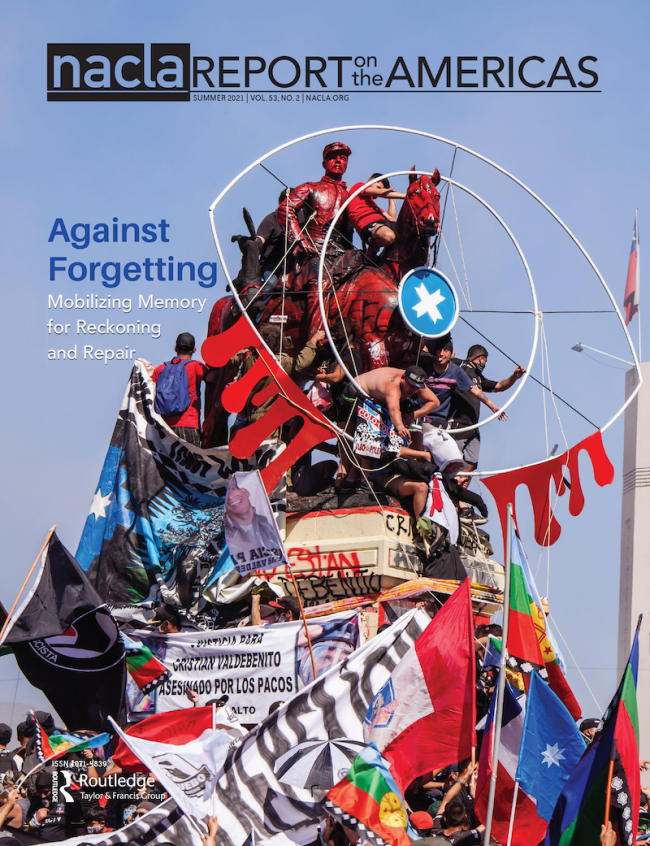
This piece appeared in the Summer 2021 issue of NACLA's quarterly print magazine, the NACLA Report. Subscribe in print today!
On the 45th anniversary of the 1976 military coup in Argentina, leaders in the struggle for memory and justice asked supporters to stay off the streets for the second year in a row. Instead, they called people to commemorate the Day of Remembrance for Truth and Justice on March 24, 2021 by planting thousands of trees across the country—one for each of the 30,000 victims forcibly disappeared under the seven-year reign of state terror.
“In times of fires, deforestation, and climate change, we invite you to plant life as an act of memory and future,” read the call to action from the organizers, including the Madres and Abuelas de Plaza de Mayo, among other groups. “Because the memory of every detained, disappeared compañerx carries the struggle for a country with more justice and solidarity.” A green leaf wrapped in the iconic white kerchief of the Madres and Abuelas de Plaza de Mayo represented the campaign, titled “Let’s plant memory.”
The Covid-19 pandemic forced new and creative ways of remembering. At the same time, during the months of lockdowns and shutdowns, many remarkable moments of reckoning bubbled up. Statues of colonizers were toppled around the world amid historic Black Lives Matter protests. “Defund the police” hit the mainstream in the United States and beyond. In Mexico, new evidence cast further doubt on the official version of events of the forced disappearance of the 43 Ayotzinapa students. In Spain, a court sentenced a former Salvadoran colonel for his role in the 1989 killing of five Spanish citizen Jesuit priests in San Salvador in the final years of the U.S.-backed internal armed conflict. In Chile, in a referendum won through a historic uprising against gaping inequality, the population voted to rewrite the country’s dictatorship-era constitution.
The terrain, however, remains uneven. Latin American and Caribbean movements pushing forward much-needed reckonings inevitably meet resistance. Their efforts knock up against an entrenched elite and a repressive defense of impunity and the status quo. In the introduction to the September/October 1998 issue of the NACLA Report, “Unearthing Memory,” the editors highlighted neoliberalism, a project “predicated upon forgetting the ideals of social solidarity, equality, and justice,” as a key ingredient in such processes. “The neoliberalization of Latin America,” they wrote, “has aided and abetted the oblivion which ruling elites have sought to impose.”
Yet that model, too, has increasingly faced a reckoning. Most monumentally, Chile’s 2019 uprising lambasted the myth of the country’s neoliberal miracle, indicting the economic experiments that drafted the blueprint for aggressive privatization and austerity across the region. The Chilean movement also connected the dots between colonization, dictatorship, and ongoing social and economic injustices. Clearly, the struggle is not just about remembering the past, but leveraging historical reckonings to reshape current conditions. As Argentine sociologist Elizabeth Jelin put it in the same 1998 NACLA issue, “To reminisce is to forge a new pact between past and present.”
New, innovative efforts to remember and grapple with history continue to emerge, falling in step alongside established movements that have dedicated decades to the fight against forgetting. These initiatives are a testament not only to the urgency of a historical memory that dignifies the victims, but also how violent and unjust pasts have powerfully shaped present-day social inequality and popular demands. Across the Americas, movements continue to chip away at oblivion.
This issue of the NACLA Report highlights a number of historical reckonings recently emerging or long under way across the region. Authors explore the legacies of colonialism, memories of dictatorships and armed conflicts, and experiences of more recent episodes of state-sanctioned violence and forgetting. Their analyses reveal how memory can be leveraged as a tool of education, political action, and alternative building, while its antithesis, forgetting, can serve as a weapon to impose silence and erasure.
Continue reading the rest of the introduction. View the full table of contents in this issue.
Heather Gies is managing editor of the NACLA Report.
Cover image by Luis Sandoval Mandujano / Alamy Stock Photo

